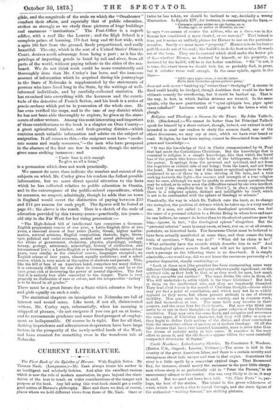Religion and Theology : a Sermon for the Times. By
John Which, D.D. (Blackwood.)—We cannot do better than let Principal Tulloch speak for himself by a short extract, though, indeed, our extract is only intended to send our readers to study the sermon itself, one of the ablest discourses, we may say at once, which we have ever heard or read. Religion, he has been saying, cannot be dissociated from intelli- gence and knowledge :—
" It was the knowledge of God in Christ communicated by St. Paul that had made the Corinthians Christians. But the knowledge that is essential to religion is a simple knowledge, like that which the loved has of the person who loves—the bride of the bridegroom, the child of the parent. It springs from the personal and spiritual, and not from the cognitive or critical side of our being ; from the heart, and not from the head. Not merely so; but if the heart or spiritual sphere be really awakened in us—if there be a true stirring of life hero, and a true seeking towards the light—the essence and strength of a true religion may be ours, although we may be unable to answer many questions that may be asked, or to solve even the difficulties raised by our own intellect. The text [' the simplicity that is in Christ'], in alma, suggests that there is a religions sphere, distinct and intelligible by itself, which is not to be confounded with the sphere of theology or science."
Practically, the way in which Dr. Tulloch cuts the knot, or, to change the metaphor, the position of defence which he takes up, is a very useful one. If a man, not called to discuss theological questions, can feel the sense of a personal relation to a Divine Being in whose love endears he can believe, he cannot do better than let theological questions pass by him,—ignore, in fact, "the theological sphere" altogether. But the "personal relation" must in many cases, at least, rest on, or at all events, postulate, an historical basis. The Incarnate Christ must be believed to have been actually manifested at some time, and then comes the long train of questions, "What was ho ?" "What did he claim to be ?" What authority have the records which describe him to us ?" And the theological sphere asserts itself, and will not be ignored. But to such a passage as the following there is no drawback. It is simply admirable,—we would say, did we not know the enormous perversity of a genuine dogmatist, simply convincing :— "Look at these men [the preacher has been enumerating some very different Christian thinkers], and many others equally significant, on the spiritual side, as they look to God, or as they work for men, how much do they resemble one another ! The same divine life stirs in them all. Who will undertake to settle which is the truer Christian ? But look at them on the intellectual side, and they aro hopelessly disunited. They lead rival forces in the march of Christian thought—forces which may yet find a point of conciliation, and which may not be so widely opposed as they seem, but whose present attitude is one of obvious hostility. Men may meet in common worship and in common work, and find themselves at one. The same faith may breathe in their prayers, and the same love fire their hearts. But men who think can never be at one in their thoughts on the great subjects of the Christian revelation. They may own the same Lord, and recognise and reverence the same types of Christian character, but they will differ so soon as they begin to define their notions of the divine, and draw conclusions from the researches either of ancient or of modern theology. Of all the false dreams that have ever haunted humanity, none is more false than the dream of catholic unity in this sense. It vanishes in the very effort to grasp it, and the old fissures appear within the most carefully compacted structures of dogma."


































 Previous page
Previous page